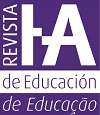Desarrollo de competencias de gestión de conflictos en la formación universitaria
DOI:
https://doi.org/10.35362/rie6021322Keywords:
Graduate education, transversal competencies, conflict resolution, conflict negotiationAbstract
Among the transversal competencies included in current curriculums we find, among others, problem resolution, decision making, negotiation…; all fundamental aspects in conflict negotiation and resolution that the students must demonstrate to have acquired upon completing the educational and training process.
The main purpose of this work is to analyze existing differences between Psychology and Law students at the beginning of their education (first year) and completion (fifth year).
Methodology: To this effect, an ex post facto exploratory study was conducted; the Rahim Organizational Conflict Inventory-II (ROCI-II) (Rahim, 1983) was administered to a sample selected from students of both courses and a variance analysis, specifically a univariate model, was conducted.
Results: The analysis of the various scales in function of degree and course indicates that there are significant differences on both variables regarding Integration; the same differences show only on the variable degree regarding avoidance and compromise.
Conclusions: This study shows that, although the students start from a similar model and style of conflict negotiation, the education and training received throughout the different courses at each professional school contribute to their different development and approach to conflict resolution.
Keywords: Graduate education, transversal competencies, conflict resolution, conflict negotiation.
Downloads
How to Cite
Downloads
Published
Issue
Section
License
Any authors who publish with this journal accept the following terms:















